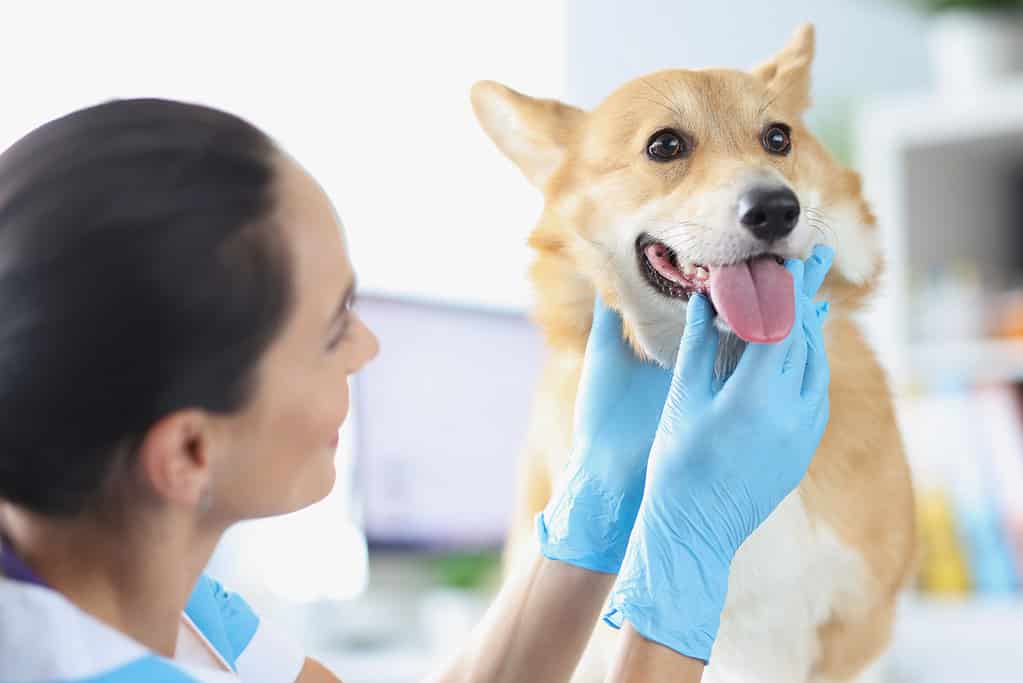Dog DNA tests are often seen as trivial, and they can be! But did you know that using a dog DNA kit can help not only your own dog but other pups around the world?
Reasons to buy a dog DNA test include learning your dog’s breed, traits, and potential health concerns. You can also potentially find your dog’s relatives or participate in scientific research that’s helping to advance the canine veterinary field.
In this article, we’ll discuss seven reasons to purchase a dog DNA test. We’ll also talk about what they can do for you and your dog.
#1: Learn Your Dog’s Breeds

Curiosity about your dog’s heritage is the most common reason to purchase a dog DNA test.
©Ansleigh Tarrant/Shutterstock.com
The top reason why people buy dog DNA tests is to find out their dog’s breeds. The most basic kits will offer this feature and little else.
Typically, people buying these kits have a rescue and want to learn more about their heritage. Others buy puppies from backyard breeders and want to know if they’re truly purebred.
It may seem obvious what breed your dog is, but the results can surprise you–especially if they’re still a puppy. Some dogs look like a specific breed, only for their results to come back with a range of other breeds that their owners didn’t predict.
Dogs are often labeled as Labrador mixes, for instance, when they actually don’t have any Lab in them at all. Remember that shelters and rescues often don’t know a dog’s history. They can only take their best guess or go off of the information given to them by the dogs’ previous owners.
#2: Get More Information About Your Dog’s Instincts

Knowing your dog’s breed genetics can tell you more about their instincts and how to provide the right mental stimulation.
©Dan_Manila/Shutterstock.com
Knowing a dog’s breed mix is fun but more important is what this tells you about them. Once you know the breeds that make up your fur baby’s DNA, you can research each breed to learn more about your dog’s traits and instincts.
As an example, I purchased a DNA test for my dog in his senior year and learned that he was 80% Labrador. But, he also had smaller amounts of German Shepherd and other herding breed lineage.
This explained his desire to herd, which I hadn’t expected when adopting a Lab. If I’d gotten the DNA test when he was a pup, I would’ve better known what to expect from him as he grew up.
When we know what our dog’s ancestors were bred for, we can better meet their needs. If they have a drive to herd, for instance, we can buy them herding balls and give them activities to fulfill that need.
You can take your retriever swimming, make sure your sighthound has room to sprint, and play scent games with your hound. These might not be activities you think of if you’re trying to provide enrichment for an entirely different dog breed!
#3: See How Big Your Puppy Will Be

While they aren’t exact, DNA tests can give you an estimate of how big your puppy will be once fully grown.
©Kseniia Grigoreva/Shutterstock.com
Many DNA tests will give you your dog’s estimated adult size. This is important for those who just adopted a puppy and for rescue groups trying to find puppies homes.
So many people adopt puppies that they think will remain small, only for them to grow much bigger than expected! The dog that’s meant to be a 30-pound beagle grows into a 75-pound English Foxhound. The miniature Poodle mix ends up being a standard Poodle mix instead.
Larger dogs aren’t any less lovable, but they do tend to be more expensive and sometimes more difficult to handle. Leash training becomes more vital, as do manners like not jumping on people.
Lastly, knowing how big your dog will grow allows you to plan ahead. You won’t have to repurchase expensive items that you thought would last their entire life, like their crate.
#4: Find Out More About Their Health

One of the most important reasons to get a dog DNA test is to learn more about your dog’s health.
©megaflopp/iStock via Getty Images
Most test kits will allow you to pay extra to receive information on your dog’s health, such as the Embark breed identification and health identification kit. They tell you which illnesses your dog may be prone to based on their genes.
If your dog is predisposed to something, you can bring it up with your veterinarian, learn about the disease, and take precautions. DNA tests aren’t meant to diagnose a dog with any ailment nor to act as genetic health tests for breeding.
Instead, they just give us more information as dog guardians. Your dog may have genes that predispose them to a disease that they’ll never actually develop, so you shouldn’t panic if you get scary results back. Think of it as arming yourself and your vet with a little extra information to potentially help your dog in the future.
In addition, DNA tests can screen for the MDR1 mutation, which can cause drug sensitivities. Knowing that your dog has this mutation can save their life. You’ll be able to avoid drugs that are normally safe but can cause life-threatening side effects for them.
#5: See How DNA Influences Your Dog’s Traits

Another reason to buy a dog DNA test is to learn more about the genes that cause your dog’s physical traits and personality.
©Sue Thatcher/Shutterstock.com
Some DNA kits provide information about your dog’s traits based on their genetics. They can tell you what your dog looks and acts like.
Not all of this information is useful–after all, you likely already know what your dog’s coat is like. But, you might not know all of the genes that make their coat what it is. This information is fascinating.
And if your dog is a puppy, you can learn more about what their adult fur might look like, their adult size, and their personality traits that you haven’t seen in person yet.
#6: Reconnect With Your Dog’s Canine Family

You may find your dog’s siblings or other relatives who have also had their DNA sent in.
©iStock.com/marcelinopozo
If your dog’s relatives were DNA tested with the same company, you’ll be able to see and learn about them. Some people even end up meeting up to let their dogs reunite!
This can be super cute, but please remember to take the same precautions as you would when introducing your dog to any other pup. It’s always possible that the dogs don’t remember or even like one another.
#7: Contribute to Canine Health Research

Dog DNA testing companies also contribute to important canine health research, which you can become a part of by purchasing a test kit.
©Mongkolchon Akesin/Shutterstock.com
Your dog’s DNA and your responses to surveys help contribute to the medical research that some of these DNA testing companies are doing. For instance, Embark is currently studying canine cancer and dilated cardiomyopathy.
They’ve also partnered with the Rhodesian Ridgeback breed club to find a genetic variant causing deafness in the breed.
Wisdom Panel also contributes to a plethora of studies, one of which might even help us understand more about human health. They’ve found a new gene linked to degenerative eye diseases such as progressive retinal atrophy in dogs and retinitis pigmentosa in humans.
Advances in canine medicine impact every dog guardian because we all want the best for our furry friends and their health. And it’s possible that they’ll even benefit our own health down the line!
Thank you for reading! If you have feedback on this post, please contact the AZ Animals editorial team.
The photo featured at the top of this post is © Natali _ Mis/Shutterstock.com
Thank you for reading! Have some feedback for us? Contact the AZ Animals editorial team.







